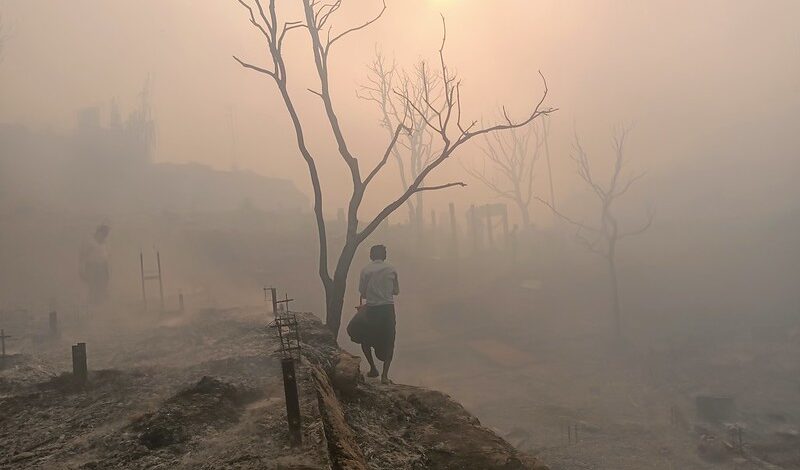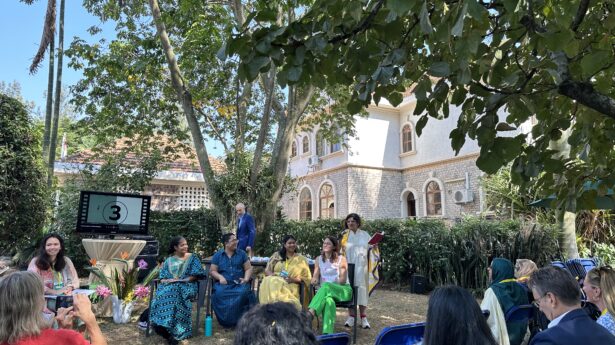The Unitarian Universalist Service Committee advances human rights through grassroots collaborations.
Attacks on Rohingya Are a Warning to the World

By Josh Leach on March 28, 2024
Ever since the Burmese military attempted to seize power in 2021 from the country’s elected government, they have imposed a reign of terror on their own population, subjecting every Burmese ethnic group to violence and abuse. But in recent weeks, the military regime has stooped to a new level of depravity: abducting Rohingya refugees and forcing them to join the very military that committed a genocide against them just seven years ago.
The junta justifies its actions on the basis of a forced conscription law, which it has invoked since February to press the country’s young adults into military service. In a recent blog on this site, we pointed out the cruel irony of this conscription policy. In short, it forces Burma’s young people to fight on behalf of the very regime that so many of them have spent years protesting, because it destroyed their democracy and curtailed their lives. (After all: who is the Burmese junta fighting in this war, exactly? That’s right: the Burmese people themselves.)
When it comes to the Rohingya, though—a majority-Muslim ethnic community in Burma who have long faced persecution, apartheid, and discrimination in their native country—this same point stands out with even greater force. After all, in 2017, the Burmese military killed and forcibly expelled hundreds of thousands of Rohingya, in an attack the international community—and our partners—have long condemned as a genocide. Thus, to forcibly recruit Rohingya into the Burmese military is literally to force them to fight for the same regime that killed their families and exiled them from their homes.
As appalling as this must sound, UUSC’s partners attest that it is happening right now across Rakhine state—a western area of Burma where the Rohingya have traditionally resided, and from which thousands of civilians were expelled in the 2017 violence. In the internally-displaced persons (IDP) camps in Rakhine, which have housed many Rohingya refugees for years in prison-like conditions (the people in these camps are often forbidden to leave or work without permission—a form of discrimination that international observers describe as apartheid), the Burmese military is now reportedly abducting Rohingya refugees to force them to suffer and die for the junta’s unjust war against its own people.
In some cases, the Burmese military has reportedly offered enticements such as official documents and better salaries to displaced Rohingya who enlist. Take a moment to consider the cynicism of that. The reason so many Rohingya are in these displaced persons camps in the first place is because of the decades of discrimination, persecution, and erasure of their citizenship they have suffered at the hands of the military. Now, suddenly, the junta claims to want them back—but only as human fodder for their war machine.
These brutal conscription efforts coincide with an intensification of fighting in Rakhine state that places Rohingya civilians at added risk. Our partners at the Burmese Rohingya Organization UK (BROUK) report that at least 38 Rohingya civilians—15 of them children—have been killed in recent military airstrikes in Rakhine. While the ongoing civil war in Burma puts everyone in danger, BROUK points out that the Rohingya are in an especially precarious position, because so many remain deprived of citizenship and restricted from moving freely.
Since the 2017 violence that forced hundreds of thousands of Rohingya into Bangladesh, UUSC and our partners have repeatedly warned that the genocide against them is still ongoing. Intensified violence, airstrikes, and forced recruitment into the military, where “service” will in many cases almost certainly mean death—all sounds alarm that this history is repeating. Without accountability for the 2017 genocide, the path has been cleared for the Burmese junta to duplicate its earlier crimes; now, they appear to be doing so.
UUSC members and supporters are not powerless in the face of this injustice. Our partners are working tirelessly to provide trauma-informed care to survivors of the junta’s atrocities. These partners include the Karen Peace Support Network, the Karen Human Rights Group, and the Kachin Women’s Association Thailand. All are women-led grassroots human rights organizations working to advance peace, document human rights violations, and support survivors and refugees from the Burmese military as they heal and rebuild their lives.
A contribution to UUSC helps to fund their work. Together, we can stop one of the worst atrocities in recent memory from happening again.
Image Credit: UUSC (MD Jamal)

